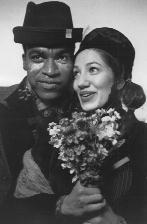SEARCH CurtainUp
REVIEWS
FEATURES
NEWS
Etcetera and
Short Term Listings
LISTINGS
Broadway
Off-Broadway
BOOKS and CDs
OTHER PLACES
Berkshires
London
LA/San Diego
DC
Philadelphia
Elsewhere
QUOTES
On TKTS
LETTERS TO EDITOR
FILM
LINKS
MISCELANEOUS
Free Updates
Masthead
Writing for CurtainUp NYC Weather
The Five Hysterical Girls Theorem
By Les Gutman
|
Numbers don't love you back. --- Rinne Groff |

C. Parnell and P. Bedi
(Photo: Jamey O'Quinn) |
There is, to be sure, a shortage of plays on math and science topics, brought on, no doubt, by the fact that most people who end up as playwrights avoided both subjects like the plague while in school. Yet this season we are confronted with plays about physics both on Broadway (Michael Frayn's Copenhagen) and off (Arthur Giron's Moving Bodies), as well as a play about biology (An Experiment with an Air Pump). Now we get together with a bunch of mathematicians at a British seaside resort in 1911, for a frolic about something called Number Theory.
What's prompting all of this? Judging by the amount of romance, intrigue, deceit and death on display in Hysterical Girls, it's not that we've finally exhausted the usual stable of subjects. What we have here really is something of a treasure hunt. Instead of going to the beach to dig in the sand, Hypatia (Abigail Savage) is busy at the huge chalkboards perched at the back of the Connelly Theatre stage, digging for the shocking proof that the number 2, to the 67th power, minus 1, is not a prime number after all.
Hypatia is the daughter of the most prominent mathematician at this international conference, Moses Vazsonyl (Steven Rattazzi). Moses, who seems to spend a lot of his time in mathematical reverie, named her for a famous 5th Century Egyptian mathematician. (Lest you think we've heard the last of her, be advised that next month playwright Mac Wellman will bring his new math play, Hypatia, to Soho Rep.) Moses is also the sort of man who is upset his eldest daughter, Kleine Esther Vazsonyl (Purva Bedi), is about to turn 18. Why? Not because she'll be old enough to run off with Pierre Louis Le Blanc de Fontanelle (Charles Parnell), a self-taught mathematician who's long on ideas but short on form, and whose notebooks become central to the "plot" Ms. Groff has devised. Rather, it's because 17 is a prime number, whereas 18 can be divided by four other numbers! The older we get, the longer we have to wait between prime numbers.
If you are beginning to suspect that this Theorem has a downtown sensibility that explains its charms for the merry gang of alterna-theater buddies at Target Margin Theater, you'd be on the right track. One of its remarkable achievements is that it ultimately conveys a striking and yet earth-bound sense of what it means to be a mathematician, without either taking itself seriously or letting the underlying humanity escape. It does it with an almost unimaginably large cast that seems at first mind-boggling (in addition to five members of the Vazsonyl family, there are three Veronese brothers and three separate men named Nikolai Nikolaiovitch), but then quite effective in David Herskovits's staging. Numbers are a lot like people, we seem to learn; it's important to discover if they are real or not, rational or irrational. To Herskovits, large numbers of people onstage just afford more ways to induce laughter.
There is a point in the first act when the language of the subject matter seems as overwhelming as just keeping track of all of the characters. (The full cast totals 18, not including two assistant stage managers who, among their other duties, keep reminding us which things we are seeing are real.) But it's fast and funny, and besides, there's a certain satisfaction when our perseverance pays off with what seems like enlightenment.
This is not to say that there are no loose ends at the final curtain, or that there are not minutes (in the first act especially) that we don't wish we had a formula to convert minutes into seconds. But judged by Mr. Herskovits's stated intention of using angled perspectives as a means to discovery, it's fair to say most of us will learn something here that we would have resisted in almost any other format.
Performances, many over the top, are very much in keeping with the overall absurdist tone and spirit of Ms. Groff's work, as filtered through the Herskovits lens. David Zinn's period costumes, worn without a wink, create a terrific counterpoint to Carol Bailey's often elbow-in-the-ribs set design that relies heavily on chalkboards and a junkyard inventory of mismatched white doors.
Experimental theater, it would seem, is particularly apt at reflecting on the nature of disciplines that are, by their nature, experimental.
LINKS TO PLAYS MENTIONED ABOVE
CurtainUp's review of Copenhagen
CurtainUp's review of Moving Bodies
CurtainUp's review of An Experiment With an Air Pump
| THE FIVE HYSTERICAL GIRLS THEOREM
by Rinne Groff Directed by David Herskovits with Peter Ackerman, Rene Alberta, Purva Bedi, Angela Bullock, Tonya Canada, Maurice Carlton, Rafael Clements, Laura Flanagan, Jordan Foster, Joyce Lee, Rizwan Manji, Mlodrag Mihajlovic, Charles Parnell, Ron Piretti, Steven Rattazzi, Abigail Savage, Yuri Skujins and John Lloyd Young Set Design: Carol Bailey Lighting Design: Lenore Doxsee Costume Design: David Zinn Sound Design: Tim Schellenbaum Running time: 2 hours, 15 minutes with one intermission A production of Target Margin Theater Connelly Theatre, 220 East 4th Street (Avs. A/B) (212) 358-3657 Opened April 26, 2000 closes May 13, 2000 Reviewed by Les Gutman 4/27/2000 based on an April 21 performance |


